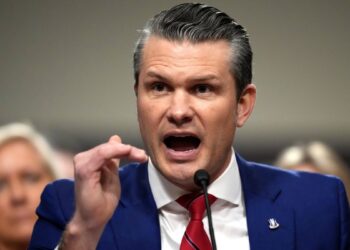Remember “Sharpiegate”? Back in September 2019, then-President Trump appeared to alter the path of Hurricane Dorian—at least on paper, with a marker. Craig McLean, who had been at the National Oceanic and Atmospheric Administration for nearly 40 years, was the acting chief scientist and head of NOAA Research. Objecting to the controversy led to serious professional repercussions.
This week, Donald Trump nominated Neil Jacobs, the former NOAA head involved in “Sharpiegate,” to lead the agency. Below, McLean explains what he anticipates for what’s next in Trump’s second term.
His story has been edited and condensed for clarity.
Dorian was a nasty hurricane. It took lives in the Caribbean and the Bahamas and was making a move toward the Florida Panhandle. Days out, there was a small chance of tropical storm–force winds in Alabama. The National Weather Service forecasted, correctly, that the storm was going to make a hard right turn and certainly not impact the people of Alabama. But Trump tweets something like, Look out people in Alabama, here comes the storm. It’s going to be bad.
The communities of Alabama, from the governor’s office to local mayors and citizens, were asking our Weather Service forecasters, What’s happening here? And they replied, You have no risk. The storm is going up the coast, it’s going to miss you. They didn’t realize what the president had tweeted. It became national news. The president doesn’t have the dignity to either leave it alone or say, “Hey, sorry. I was relying on misinformation.”
I’m up on Cape Cod, and I get a message from one of my staff saying, “You don’t want to see this, but you better read it.” It’s a press release from “NOAA”—no person associated with the remarks—chastising Weather Service forecasters, saying they were incorrect, and the president was correct as a technical matter. I really had to contain myself.
Project 2025 plans to break up and reduce the components of NOAA. But the services NOAA provides, every citizen uses every day.
I wrote a one-page memorandum that called this out as political. Later, after an independent investigation, I asked political appointees at NOAA to sign an affirmation that they read and fully understood their obligations under the agency’s scientific integrity policy. That was probably just too much.
Soon after, I had a response back from the acting NOAA chief of staff asking about my authority to ask for this affirmation. I said I was the acting chief scientist, the assistant administrator for research, and a NOAA employee. The acting NOAA chief of staff says something like, Thank you very much for your response. You’re no longer the acting chief scientist. You’re being replaced. Thank you for your service.
Political manipulation wasn’t unique to the Trump administration, but the collapsed ethics were profound. That the law may say what one must do, and—Don’t worry about the law. This is what I want you to do instead.
Early on, I was told I should find people from different communities of the science world to speak for climate. They wouldn’t say, “People who don’t believe your current climate conclusions.” But it was pretty clear.
When you have lunacy in the control tower, you have to fly the airplane yourself. And the best way to fly that airplane yourself is to go back to the rules of the road—the law. When crazy people give you instructions to do unlawful, damaging things, you go to the first level of defense. The law requires NOAA to produce, analyze, verify, present, and explain what data means. And so we did.
In elections, you elect policy. You don’t elect science.
Coming into government, the first Trump administration was not planned out. They didn’t have a real transition team in place, as many other elected administrations do. But this time around, they’re hitting the ground running. But what are they going to run into? Are they going to run into federal senior executives who tell them, “No, you can’t do that, because the law won’t allow you”?
This Trump administration is going farther than I thought it would. They’re not even going at the substance. They’re looking at the long game, going after the size of the staff. Just by cutting the number of people, they’ll defeat the mission of the agency.
Project 2025 plans to break up and reduce the components of NOAA. But the services NOAA provides, every citizen uses every day. They just don’t realize what and how.
NOAA answers four God-level questions: How many fish are in the sea? NOAA has to answer that every year, in order to manage the fisheries and so we have food security. What will the weather be like tomorrow? The Weather Service exists in law as the provider of weather forecasts for the nation. What’s the weather going to be 50, 100, or 10 years from now? That’s climate. And lastly, can we make the coasts resilient to the increased ferocity of storms? That’s what NOAA is delivering.
Fifty to 100 years from now, we’ll be living on a Mad Max movie set. And that really bothers me because my grandkids will be on that movie set. Without NOAA, you’re not going to be able to tell how bad it’s happening, or how fast.







